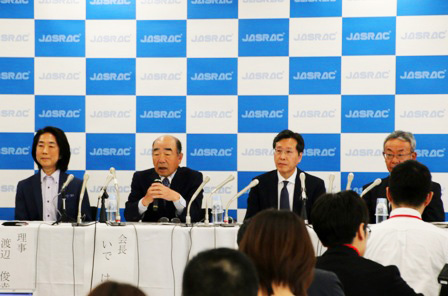- > Top Page
- > Information
- > Introduce comments (administration at musical instrument classes) by Chairman Haku Ide (lyricist), and Director Toshiyuki Watanabe (composer) at the Press Conference on June 7.
Information
July 11, 2017
Introduce comments (administration at musical instrument classes) by Chairman Haku Ide (lyricist), and Director Toshiyuki Watanabe (composer) at the Press Conference on June 7.

On June 7 (Wednesday), JASRAC reported the tariff on performance, etc. at musical instrument classes to the Commissioner for Cultural Affairs. On the same day, JASRAC held a press conference on this notification, with the attendance of Chairman Haku Ide, Director Toshiyuki Watanabe, President Michio Asaishi and Managing Director Kenzo Ohashi. At the press conference, after President Asaishi reported the notification of the tariff and Managing Director Ohashi explained details of the rates, etc., Chairman Ide and Director Watanabe as creators commented on administration at musical instrument classes. The points of comments by Chairman Ide and Director Watanabe are as follows, respectively.
Comment by Chairman Haku Ide (lyricist)
“I would appreciate it if people could show a little more respect to creators. It needs a lot of energy and efforts to create music from nothing. Valuing this is beyond dispute. If Japan aims to be a more cultural nation, it is important to pass on such respect to creators.
Education consists of teaching and nurturing. I think we can provide education through which children want to become musicians and creators, while valuing the copyright system. And I believe we will be able to send out wonderful music from Asia to the world by nurturing children who want to become musicians and creators.”
Comment by Director Toshiyuki Watanabe (composer)
“On the Internet, public opinion tends to be against this issue and people say, ‘Does JASRAC want to collect money from children’s education?’ or something like that, but I am very sorry to hear that as a creator. Music royalties are very important for creators to sustain their livelihoods. For example, even if record companies adopt a work, its creators don’t receive any commission, etc. at that time. They can earn money only when CDs are sold or when music is used. For your reference, about 5 yen (depending on conditions including sales price) is distributed per work when one single CD is sold. If people understand that creators live off their royalties, they would not feel that ‘JASRAC greedily wants to collect more money.’
For example, farmers who have grown vegetables with difficulty will be in trouble if they must provide them at no charge for school lunches because the purpose is educational. However, the music created by songwriters and composers does not decrease no matter how much it is used. Therefore, people may well think that such usage should be free.
Some people also say that performance at music schools does not infringe on the right of performance because it does not fall within the range of ‘giving a musical performance of the work with the purpose of having it seen or heard directly by the public’ as is specified in Article 22 of the Copyright Act. But, I think that schools that mainly teach works whose copyrights have not expired yet conduct profit-making business through performance and that the right of performance is normally on managers of such schools. It would be easier to understand if you think of karaoke. If a customer uses a karaoke box to practice songs, there is no public that directly hears songs and music works may be used in fragments. In such cases, however, JASRAC receives performance royalties from the owner of the venue. I would like you to understand that, as far as profit-making business is conducted through performance of musical works, the right of performance is on owners.
I tell you just in case that royalties are not collected from music schools that focus on classical music works including those of Chopin and Beethoven because the performance right does not arise due to the expiration of copyright of the works. I personally greatly respect the educational activities by Yamaha and Kawai. There are many musicians from Yamaha. I am so sorry I have to comment in a conflicted position. I just hope that music creators can work in that field with a sense of security, that parents can recommend their children to work in the musical field and that copyrights will be protected.
I also teach at a music university. I understand the importance of music education. If we apply 2.5% to a lesson fee of 3,000 yen, the royalty amounts to about 70 yen. I thought it was reasonable. If I had felt it was too much, I would have said no at the board meeting of JASRAC.”
End
JASRAC-International Relations Department:
